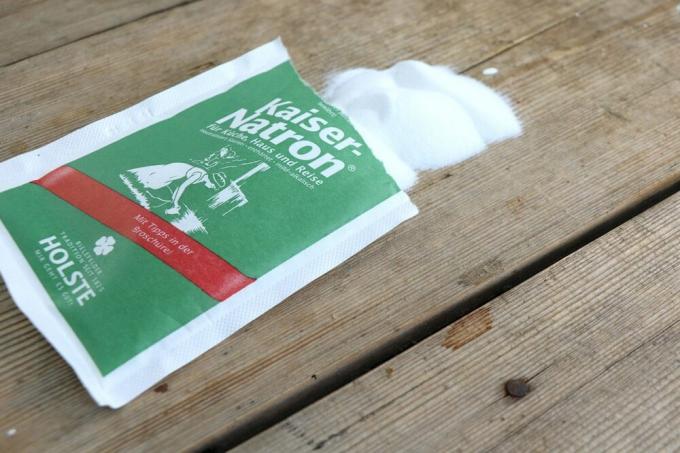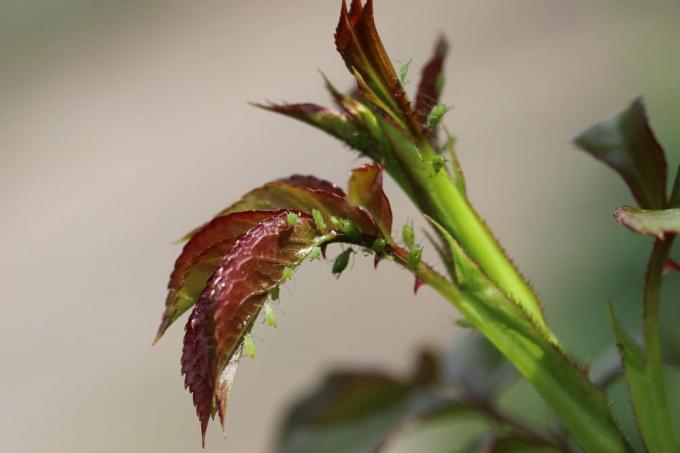

Table of contents
- ingredients and effects
- Advantages and disadvantages
- Health
- Fight ants naturally
Ants can become a nuisance once they find their way into your home. Although they are not regarded as storage pests, they are still not pleasant companions. Especially if there are children or pets in the apartment, a quick solution to the problem is desirable. Ant sprays are one way to control insects.
ingredients and effects
Ant killers contain active substances that effectively fight the ants. In addition, the products are enriched with so-called inert or neutral substances, which complete the recipe. This group of substances includes stabilizers, propellants, fragrances and preservatives that are not used to control insects. The actual active substances are various pyrethroids, which act as contact poisons against various sucking, biting or crawling insects. If ants come into contact with the active ingredients, the sodium channels in the nerve membranes are blocked. This constipation no longer resolves itself and initially leads to spastic paralysis. The insects can no longer move and eventually die. There are various synthetic pyrethroids that are approved as biocides in Germany. They have different properties:
- Imiprothrin: Slightly toxic to mammals, but highly harmful to aquatic life
- Cybermethrin: can be broken down by insects if the dose is not sufficient
- pellethrin: moderately toxic to mammals, highly toxic to aquatic organisms and bees
Tip:
Avoid ant poisons that are offered as granules or pouring agents. If the substances get into the garden soil, they are not broken down, but absorbed by plants such as fruit and vegetables.
Advantages and disadvantages
Ant sprays work particularly quickly. They are easy to use and can be used with pinpoint accuracy. However, the funds do not act selectively. They can equally be used against other unwanted crawling insects, but they also damage beneficial insects. The main disadvantage is that ant spray is very easily inhaled by humans and pets. Terrariums, aquariums and animal cages should therefore be removed from the room before use. If it is used outdoors, it can be washed away when it rains. Indoors, it is removed by cleaning and must be applied more frequently until the problem is resolved.
Health
While the products are classified as harmless to humans, you should still avoid inhaling the spray. The various active ingredients can irritate the respiratory tract and, if inhaled frequently as a result of multiple uses, can lead to various respiratory diseases. Therefore, use ant sprays with care and ensure that the interior is well ventilated. In principle, bait cans are more suitable than sprays, since these products do not emit a spray mist with chemical active substances into the room air.
A notice:
When buying ant spray, pay attention to the recommended area of use. Products for the garden usually smell much more intensively and are not suitable for indoor use.
Fight ants naturally

There are numerous home remedies that protect your health and combat the ant plague in a natural way. Although these methods sometimes take a little longer to completely eliminate ants, they are still preferable to chemical means. Home remedies are environmentally friendly and do not affect beneficial insects or other living beings.
- baking soda: swells in the ants' stomachs, causing them to burst
- Duct tape: Glued to an ant trail, ants lose their scent trail and can no longer find their way
- Chalk: has an effect similar to sticky tape
- neem oil: prevents the reproduction of ants
- Cinammon: impairs the sense of direction when scattered on the ant trail
 garden editorial
garden editorial I write about everything that interests me in my garden.
Learn more about pests

Identifying wood pests: overview
In nature, insects that break down wood make a valuable contribution. If the wood is a roof truss, for example, the insect becomes a pest that must be combated in order to avoid expensive damage.

Mole Cricket: Should You Fight Them? | Were in the garden
The mole cricket, or Werre, as it is also known, often lives unnoticed in gardens and parks. Because the insect with the scientific name Gryllotalpa gryllotalpa spends a large part of its life underground. Fighting them is only necessary in a few cases.

Combat Whitefly | 11 home remedies for whiteflies
The whitefly is a tiny creature whose presence on our plants can have unpleasant effects. If a few specimens come across a healthy garden, there is hardly anything to fear. If the flies are there in droves, proven home remedies must be used immediately.

Ant remedy | 13 natural remedies against ants
Ants are more than annoying bugs. In nature, they contribute to the preservation of the forest and keep pests away. If they undermine the terrace slabs in the garden or penetrate into the house, they must be fought. Which natural remedies are effective?

Drive away cockchafers: recognize grubs | 5 natural enemies
"Fly maybeetle!" says an old children's song about death and destruction. In fact, the larvae of the cockchafer, the grubs, can cause considerable damage in some years. How to fight the plague with natural means.

13 home remedies against aphids: coffee grounds, garlic, tea tree oil & Co
There are a variety of household remedies that will get rid of aphids. Many products are available in every household. A watery solution can be prepared in just a few steps and sprayed directly onto the plant.



